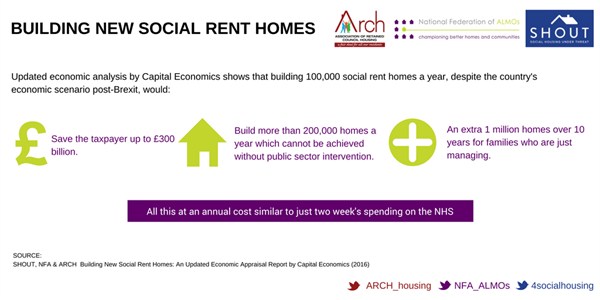Building 100,000 social rent homes a year would save the country
billions whatever happens to the economy post-Brexit according to
new research published today.
ARCH has come together with the National Federation of ALMOs
(NFA), The Local Government Association (LGA) and SHOUT (the
campaign for social housing) to commission research by City
consultancy Capital Economics to assess the impact of future
investment in social rented housing on the UK economy in the light
of Brexit.
Analysing potential future direction for borrowing costs and
economic growth, the new analysis Building New Social Rent Homes An Updated Economic
Appraisal presents four scenarios for the economy
post-Brexit ("Britain becomes Japan"; "Back to the 1970s", "Strong
Economic Growth" and "Capacity Constraints"). The research finds
that in each of the scenarios funding new social housing would
deliver long term savings to the Government of up to £300
billion.

Among its findings:
- Investing in genuinely affordable new homes for rent will
reduce the massive bill the taxpayer currently picks up in housing
benefit - paying the rents of low-income households in the private
sector. Over a 50 year period the saving would be between £100
billion and £300 billion;
- The upfront cost to the Exchequer of building 100,000 new
social rented homes a year would cost no more than two weeks' worth
of current spending on the NHS;
- Borrowing for investment in valuable physical assets is good
for the economy and would be welcomed by the financial sector.
ARCH and the NFA, whose members manage more than one million
council homes in England and Wales, and SHOUT's campaigners are
calling on Theresa May's new government to invest in 100,000 new
homes per year at genuinely affordable rents in the new economic
environment following Brexit.
At a time when the LGA has warned that four million working
people will no longer be able to find somewhere affordable to live
by 2024, Hugh Broadbent, Chair NFA points out
that:
"To complete a 100,000 new homes per annum housebuilding
programme would only cost £7bn - the equivalent of two weeks' worth
of spending in the NHS. But, in the long-run the return on this
borrowing would deliver greater savings to the taxpayer and the
economy. Critically the investment needed would be paid for through
rental income and not from general taxation".
The experts at Capital Economics add:
"Not all borrowing is the same. It would be quite right to be
concerned about an increase in public debt in order to fund the
day-to-day costs of public services. Borrowing to invest or save,
as for this policy, is prudent however and would likely be welcomed
rather than met with alarm."
Martin Wheatley, a leading member of the SHOUT housing
campaign said:
"This research shows that public investment in lower rent rental
housing can and should be central to Theresa May's ambition to help
those families who are "just getting by." As well as providing a
secure home at a rent households can afford, such investment would
save the taxpayer billions in the long term. Support for a council
house-building renaissance, alongside development by other social
landlords and the private sector is critical if the Government is
to achieve its ambitions for 200,000 or more new homes per
year."
And Councillor Paul Ellis, Chair ARCH said:
"For some time large parts of the country have experienced a
housing crisis, and it is increasingly obvious that positive action
needs to be taken sooner rather than later. Innovative ideas from
several Councils and their partner ALMOs have already shown we are
more than capable of being part of the solution, and we want to do
more. In addition to increasing Britain's housing stock by more
than four million homes over 50 years, a Council led house-building
programme would go a long way to help families who are being priced
out of the market. Councils and ALMOs are up for the challenge, and
are ready to play our part."
The findings of the report by Capital Economics follows the
release of a
report by the Housing Finance Institute (HFi) calling
for regional local councils to be exempted from the High Value
Asset Levy to be introduced under the Housing Act 2016.
ARCH will be raising the findings of the report with the Housing
Minister when we meet on 12 October and will form part of the ARCH
submission to the government in advance of the upcoming Autumn
Statement.